In the realm of modern dentistry, titanium dental implants have revolutionized the way we approach tooth replacement. These innovative devices offer a permanent solution for those who have lost teeth due to injury, decay, or other dental issues. However, as with any medical procedure, questions Are Titanium dental implants safe about safety naturally arise. This comprehensive article delves into the world of titanium dental implants, exploring their benefits, potential risks, and overall safety profile to help you make an informed decision about your oral health.
Understanding Titanium Dental Implants
Titanium dental implants have become the gold standard in tooth replacement technology, offering a durable and natural-looking solution for missing teeth. Before we dive into the safety aspects, it’s crucial to understand what these implants are and why they’ve gained such popularity in the dental field.
What are Titanium Dental Implants?
Titanium dental implants are artificial tooth roots designed to replicate the function and appearance of natural teeth. These small, screw-like devices are surgically inserted into the jawbone, where they serve as anchors for replacement teeth.
The implant itself consists of three main components:
- The implant body: This is the titanium screw that is placed directly into the jawbone. It acts as the root of the artificial tooth.
- The abutment: A connector piece that attaches to the top of the implant body and extends above the gum line. It serves as a base for the artificial tooth.
- The crown: The visible part of the implant that looks and functions like a natural tooth. It’s custom-made to match your existing teeth in color and shape.
The process of getting a titanium dental implant typically involves several steps spread out over a few months. After the initial consultation and treatment planning, the implant body is surgically placed into the jawbone. Over the next few months, a process called osseointegration occurs, where the bone grows around and fuses with the implant, creating a strong and stable foundation.
Once osseointegration is complete, the abutment is attached, and finally, the custom-made crown is placed on top. This meticulous process ensures that the final result is not only aesthetically pleasing but also fully functional and long-lasting.
The Benefits of Titanium in Dentistry
Titanium has become the material of choice for dental implants due to its unique properties that make it ideal for use in the human body. Let’s explore some of the key benefits that have made titanium the preferred material in implant dentistry.
Biocompatibility: One of the most significant advantages of titanium is its exceptional biocompatibility. This means that the human body generally accepts titanium without triggering an immune response or rejection. When a titanium implant is placed in the jawbone, the body doesn’t recognize it as a foreign object, allowing for successful integration with the surrounding bone tissue.
This biocompatibility is largely due to titanium’s ability to form a thin oxide layer on its surface when exposed to air or bodily fluids. This oxide layer acts as a protective barrier, preventing corrosion and reducing the risk of allergic reactions. As a result, titanium implants have a high success rate and are well-tolerated by the vast majority of patients.
Osseointegration: Closely related to its biocompatibility is titanium’s remarkable ability to osseointegrate. Osseointegration is the process by which the implant fuses with the surrounding bone tissue, creating a strong and stable foundation for the artificial tooth. This unique property of titanium was discovered by Swedish orthopedic surgeon Per-Ingvar Brånemark in the 1950s and has since revolutionized both dentistry and orthopedics.
The osseointegration process typically takes several months, during which new bone cells grow and adhere directly to the titanium surface. This creates a bond that is often stronger than the original tooth root, providing excellent stability and support for the artificial tooth. The success of this process is what allows titanium implants to function like natural teeth, withstanding the forces of biting and chewing for many years.
Durability and Strength: Titanium is renowned for its exceptional strength-to-weight ratio. It’s as strong as steel but 45% lighter, making it an ideal material for dental implants. This strength allows titanium implants to withstand the significant forces exerted during chewing and biting, which can range from 70 to 150 pounds per square inch.
Moreover, titanium is highly resistant to fatigue, meaning it can endure repeated stress without breaking or wearing down. This property contributes to the longevity of titanium dental implants, which can last a lifetime with proper care and maintenance.
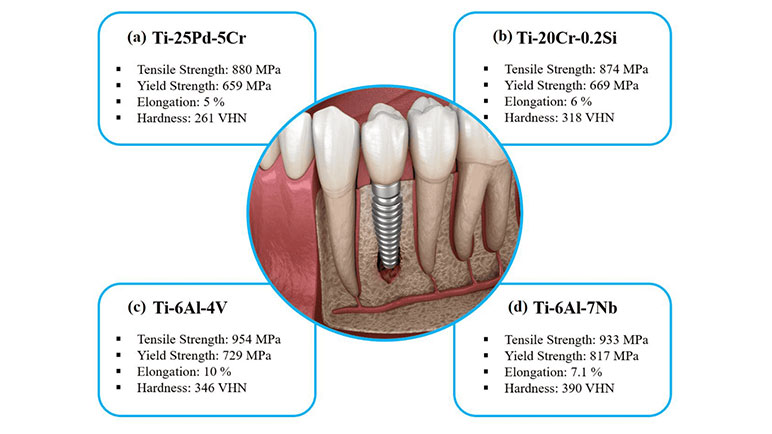
Corrosion Resistance: The oral environment is particularly challenging for materials due to constant exposure to saliva, bacteria, and varying pH levels. Titanium excels in this environment due to its outstanding corrosion resistance. The protective oxide layer that forms on the surface of titanium implants prevents degradation, ensuring the implant remains stable and functional for many years.
This corrosion resistance not only contributes to the longevity of the implant but also minimizes the risk of metal ions being released into the surrounding tissues, which could potentially cause adverse reactions.
Versatility: Titanium’s unique properties make it a versatile material that can be used in various dental applications. While it’s most commonly used for the implant body, titanium can also be used for abutments and even some dental crowns. Its ability to be machined into precise shapes allows for the creation of custom implants that fit perfectly into a patient’s unique jaw structure.
Furthermore, titanium can be alloyed with other metals to enhance its properties for specific applications. For example, titanium-zirconium alloys have been developed to provide even greater strength for small diameter implants, expanding the options for patients with limited bone volume.
In conclusion, the benefits of titanium in dentistry are numerous and significant. Its biocompatibility, ability to osseointegrate, strength, durability, corrosion resistance, and versatility have made it the material of choice for dental implants. These properties contribute to the high success rates and long-term effectiveness of titanium dental implants, providing patients with a reliable and lasting solution for tooth replacement.
Safety Considerations of Titanium Dental Implants
While titanium dental implants offer numerous benefits and have a strong track record of success, it’s important to consider the potential safety concerns associated with this dental procedure. Understanding these considerations can help patients make informed decisions and take necessary precautions to ensure the best possible outcomes.
Biocompatibility and Allergy Concerns
One of the primary reasons for the widespread use of titanium in dental implants is its excellent biocompatibility. However, it’s crucial to acknowledge that no material is 100% risk-free for every individual.
Titanium Allergies: While extremely rare, some individuals may have an allergic reaction to titanium. The prevalence of titanium allergies is estimated to be less than 1% of the population. Symptoms of a titanium allergy can range from mild skin irritation to more severe reactions such as chronic inflammation or implant failure.
It’s important to note that many reported cases of “titanium allergies” may actually be reactions to other metals present in titanium alloys. Pure titanium implants are less likely to cause allergic reactions compared to titanium alloys that contain small amounts of other metals like nickel or vanadium.
For patients with a history of metal allergies or those concerned about potential reactions, allergy testing can be performed before the implant procedure. Patch tests or blood tests (like the MELISA test) can help identify potential sensitivities to titanium or other metals.
Alternative Materials: For patients with confirmed titanium allergies or those who prefer metal-free options, alternatives such as zirconia implants are available. Zirconia is a ceramic material that offers excellent biocompatibility and aesthetics. However, it’s worth noting that zirconia implants have a shorter track record compared to titanium and may not be suitable for all clinical situations.
Galvanic Corrosion: In some cases, when titanium implants come into contact with other metals in the mouth (such as gold or amalgam fillings), there’s a potential for galvanic corrosion. This electrochemical process can lead to the release of metal ions, potentially causing local tissue irritation or implant failure. However, modern implant designs and careful treatment planning have greatly reduced this risk.
Long-term Health Effects
While titanium dental implants have been in use for several decades with a strong safety record, it’s important to consider potential long-term health effects.
Peri-implantitis: One of the most significant long-term concerns with dental implants is the development of peri-implantitis. This inflammatory condition affects the soft and hard tissues surrounding dental implants, similar to how periodontitis affects natural teeth. If left untreated, peri-implantitis can lead to bone loss and ultimately implant failure.
Risk factors for peri-implantitis include poor oral hygiene, smoking, diabetes, and a history of periodontal disease. Regular dental check-ups and meticulous oral hygiene are crucial for preventing and managing this condition.
Bone Loss: While dental implants can help preserve jawbone density by providing stimulation similar to natural tooth roots, some bone loss can still occur over time. This is usually minimal and occurs slowly, but factors like peri-implantitis, smoking, or systemic health conditions can accelerate bone loss.
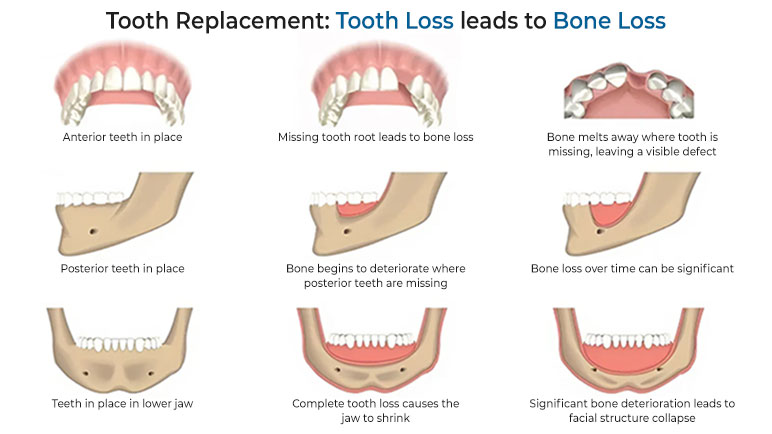
Mechanical Complications: Over many years of use, there’s a potential for mechanical issues with dental implants. These can include loosening or fracture of the implant components, though such occurrences are relatively rare with modern implant systems.
Systemic Health Concerns: Some studies have investigated the potential systemic effects of titanium implants, particularly regarding the release of titanium particles or ions into the body. While most research indicates that the levels of titanium released from dental implants are well below toxic thresholds, this remains an area of ongoing study.
A 2019 review published in the Journal of Clinical Medicine concluded that while titanium particles can be detected in tissues and organs distant from the implant site, there’s currently no strong evidence linking properly placed titanium dental implants to any systemic health issues.
Long-term Success Rates: It’s worth noting that the long-term success rates of titanium dental implants are very high. A 2017 systematic review published in the Journal of Dental Research found that the 10-year survival rate for single implants was 96.4%. This high success rate over an extended period provides reassurance about the long-term safety and efficacy of titanium implants.
In conclusion, while titanium dental implants are generally considered safe and effective, it’s important for patients to be aware of potential risks and complications. Most safety concerns can be mitigated through proper patient selection, meticulous surgical technique, and diligent post-operative care. As with any medical procedure, the decision to get dental implants should be made in consultation with a qualified dental professional, taking into account individual health factors and preferences.
Notes
When considering titanium dental implants, there are several important factors to keep in mind. These notes provide additional context and considerations to help you make an informed decision about your dental health.
Importance of Choosing a Qualified Dentist
The success and safety of titanium dental implants largely depend on the skill and experience of the dental professional performing the procedure. Choosing a qualified and experienced implant dentist is crucial for ensuring the best possible outcomes.
Specialized Training: Look for a dentist who has received specialized training in implant dentistry. This may include postgraduate programs, certifications from recognized implant organizations, or extensive continuing education in the field.
Implant dentistry is a complex field that requires a deep understanding of surgical techniques, prosthodontics, and periodontics. A dentist with specialized training will be better equipped to handle various clinical situations and potential complications.
Experience: Consider the dentist’s experience specifically with titanium dental implants. Ask about their success rates and how many implant procedures they’ve performed. An experienced implant dentist will have encountered a wide range of cases and will be better prepared to handle any challenges that may arise during your treatment.
Don’t hesitate to ask for before-and-after photos of previous patients or testimonials. This can give you a sense of the dentist’s skill and the quality of their work.
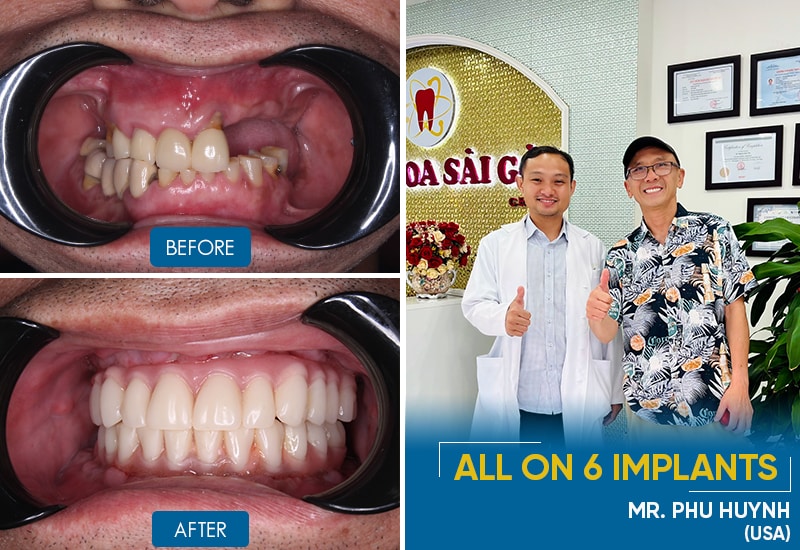
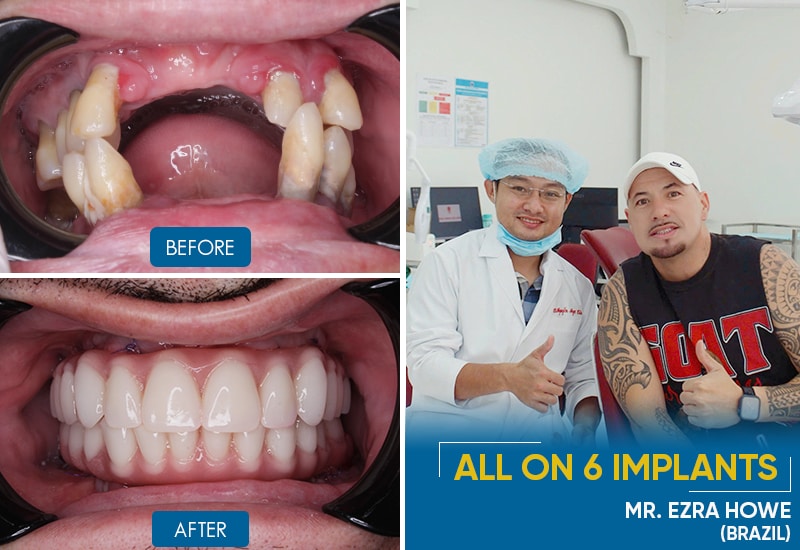

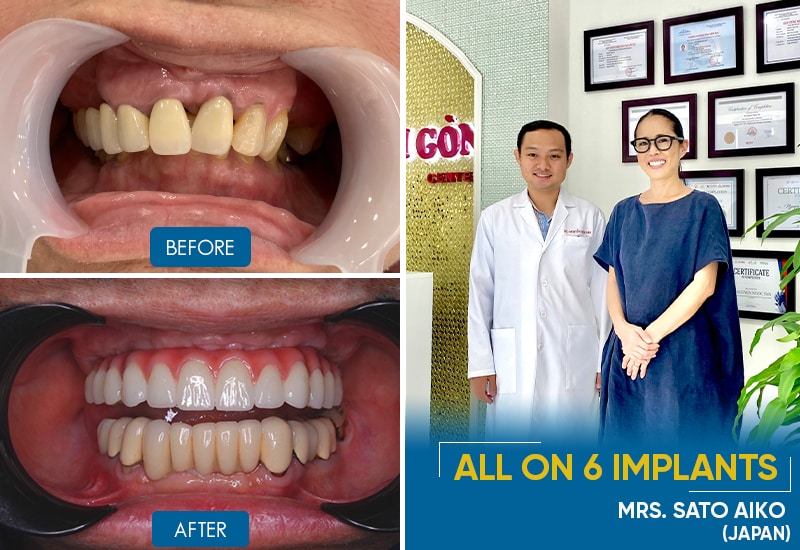
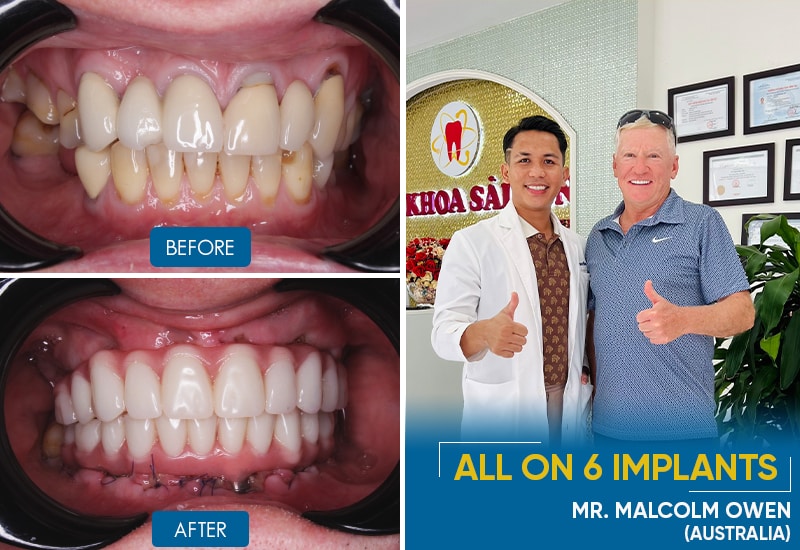
Technology and Techniques: Inquire about the technology and techniques the dentist uses for implant procedures. Advanced imaging technologies like 3D cone beam computed tomography (CBCT) can greatly enhance the precision of implant placement. Computer-guided implant surgery is another advanced technique that can improve accuracy and reduce surgical time.
A dentist who invests in modern technology and stays updated with the latest techniques is more likely to provide high-quality, state-of-the-art implant care.
Comprehensive Approach: Look for a dentist who takes a comprehensive approach to implant treatment. This should include a thorough initial assessment, detailed treatment planning, and a clear explanation of the entire process, including potential risks and alternatives.
A good implant dentist will also emphasize the importance of proper aftercare and long-term maintenance. They should provide you with detailed instructions for care during the healing process and schedule regular follow-up appointments to monitor the health of your implants.
Factors That Influence Implant Success
While the skill of the dentist is crucial, several other factors can influence the success of titanium dental implants. Understanding these factors can help you take proactive steps to ensure the best possible outcomes.
Oral Hygiene: Maintaining excellent oral hygiene is essential for the long-term success of dental implants. Poor oral hygiene can lead to the accumulation of bacteria around the implant, potentially causing peri-implantitis and implant failure.
Patients should be committed to a rigorous oral hygiene routine, including regular brushing, flossing, and use of interdental brushes or water flossers. Your dentist may also recommend antimicrobial mouthwashes to help control bacteria levels.
Smoking: Smoking has a significant negative impact on implant success rates. It reduces blood flow to the gums, impairs healing, and increases the risk of infection. Studies have shown that smokers have a higher rate of implant failure compared to non-smokers.
If you’re a smoker considering dental implants, your dentist may strongly recommend quitting or at least significantly reducing your tobacco use before and after the implant procedure.
Bone Quality and Quantity: Sufficient bone density and volume are crucial for successful implant placement and osseointegration. Patients who have experienced significant bone loss due to periodontal disease, long-term tooth loss, or other factors may require bone grafting procedures before implant placement.
Advanced imaging techniques like CBCT scans can help assess bone quality and quantity, allowing for precise treatment planning.
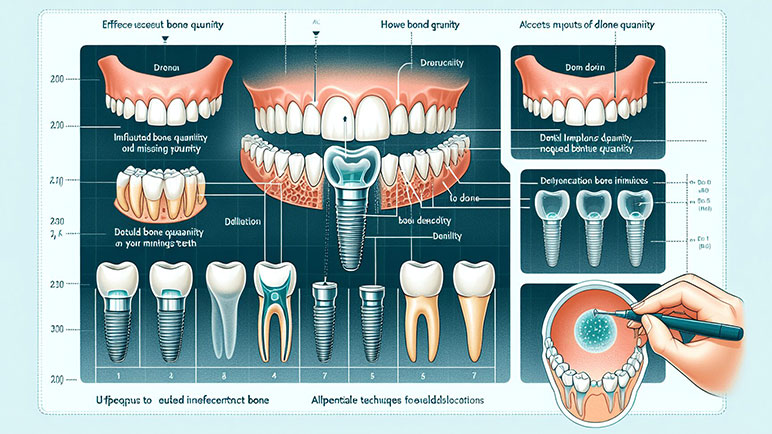
Overall Health: Certain medical conditions can affect implant success rates. Uncontrolled diabetes, for example, can impair healing and increase the risk of infection. Autoimmune disorders, osteoporosis, and some medications (like bisphosphonates used to treat osteoporosis) can also impact implant success.
It’s crucial to provide your dentist with a comprehensive medical history and inform them of any medications you’re taking. In some cases, your dentist may need to consult with your physician to ensure that implant surgery is safe and appropriate for you.
Bruxism (Teeth Grinding): Patients who grind or clench their teeth may be at higher risk for implant complications. The excessive forces generated by bruxism can potentially lead to implant failure or damage to the prosthetic crown.
If you have a history of bruxism, your dentist may recommend wearing a night guard to protect your implants and natural teeth.
Patient Compliance: Following your dentist’s instructions for pre- and post-operative care is crucial for implant success. This includes adhering to dietary restrictions, taking prescribed medications, attending follow-up appointments, and following oral hygiene recommendations.
Patients who are committed to following their dentist’s instructions and maintaining good oral health are more likely to experience successful long-term outcomes with their dental implants.
In conclusion, while titanium dental implants have a high success rate, numerous factors can influence their long-term success. By choosing a qualified dentist, maintaining excellent oral hygiene, addressing any health concerns, and following your dentist’s instructions, you can significantly improve your chances of a successful implant procedure and enjoy the benefits of a restored smile for many years to come.
Mistakes to Avoid
When considering or undergoing titanium dental implant treatment, being aware of common mistakes can help ensure a smoother, more successful experience. Here are some key errors to avoid throughout the implant process.
Ignoring Pre-Operative Evaluations
Pre-operative evaluations are a crucial step in the dental implant process. Skipping or not taking these evaluations seriously can lead to complications and potentially compromise the success of the implant procedure.
Importance of Comprehensive Health Assessment: A thorough health assessment is essential before proceeding with dental implant surgery. This evaluation helps identify any underlying health conditions that could affect the success of the implant or pose risks during the procedure.
Patients should provide a complete and honest medical history, including all medications and supplements they’re taking. Certain conditions like uncontrolled diabetes, autoimmune disorders, or a history of radiation therapy to the head and neck area can impact implant success and may require special considerations.
Failing to disclose relevant health information could lead to unexpected complications during or after the implant procedure. It’s always better to err on the side of caution and share all health-related information with your dental team.
Underestimating the Importance of Dental Imaging: Advanced dental imaging techniques, particularly 3D cone beam computed tomography (CBCT) scans, play a crucial role in implant planning. These scans provide detailed information about bone density, volume, and the location of vital structures like nerves and sinuses.
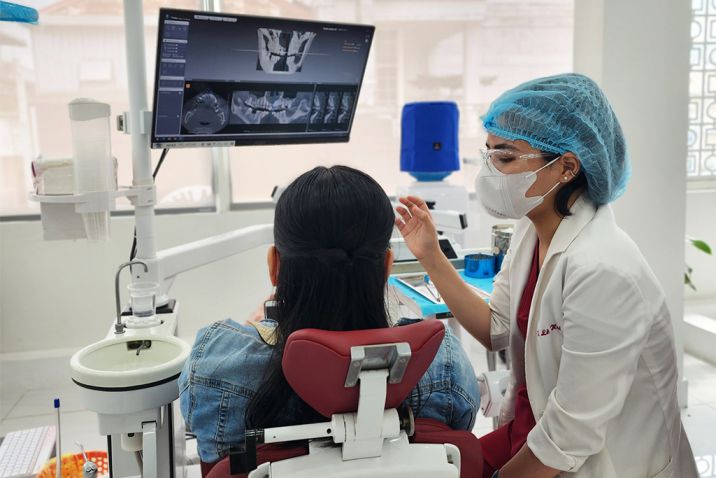
Skipping or opting out of recommended imaging studies can lead to suboptimal implant placement or increase the risk of complications. For example, without proper imaging, an implantmay be placed too close to a nerve, resulting in pain or sensory issues. It can also lead to miscalculations regarding bone density, increasing the risk of implant failure.
By adhering to pre-operative evaluations, patients equip their dental team with critical information that contributes to successful implant placement. This not only ensures a better outcome but also enhances the safety and efficiency of the entire procedure.
Overlooking Aftercare Instructions
Aftercare plays an integral role in the success of titanium dental implants. Neglecting post-operative care can jeopardize the healing process and potentially lead to complications.
Significance of Personalized Aftercare Plans: Following your dentist’s aftercare instructions is vital for ensuring optimal healing. Each patient may have different needs based on factors such as specific procedures performed, overall health, and lifestyle habits.
Typically, patients should be informed about what to expect after surgery, including dietary restrictions and hygiene practices. For instance, soft foods may be recommended immediately following the procedure to avoid putting stress on the newly placed implants. Patients should also understand the importance of maintaining oral hygiene at the surgical site without disturbing the area too much.
Ignoring these tailored recommendations could delay healing or increase the risk of peri-implantitis, an inflammatory condition caused by bacteria around the implant site.
Attending Follow-Up Appointments: Regular follow-up visits are equally essential in monitoring the healing process and assessing the success of the implants. These appointments allow dentists to identify any potential issues early on, such as infection or improper osseointegration.
Some patients may underestimate the importance of attending these follow-ups, mistakenly believing that the procedure is complete once the implants are placed. However, ongoing evaluation is necessary to ensure that the area around the implant remains healthy. Failing to keep these appointments can result in serious complications down the line.
As recovery progresses, patients might also benefit from periodic assessments that provide reassurance regarding the stability and function of their implants.
Frequently Asked Questions
When it comes to titanium dental implants, many patients have numerous questions that can influence their decision-making process. Understanding these common queries can help alleviate some concerns related to this treatment.
How long do titanium dental implants last?
Titanium dental implants are renowned for their durability and biocompatibility, often lasting for 10 years or even longer with proper care. The longevity of an implant can be influenced by various factors, including the individual’s oral hygiene, lifestyle, and adherence to follow-up care.
Regular maintenance is crucial for implant longevity. Routine dental check-ups and professional cleanings are recommended to ensure the healthy surrounding tissues remain intact, thereby supporting the implant effectively. Furthermore, a commitment to good oral hygiene—such as daily brushing and flossing—is essential.
In summary, while there are no guarantees, many patients can enjoy their titanium dental implants for decades with dedicated care and professional oversight.
What should I expect during the recovery process?
The recovery process following titanium dental implant placement is typically gradual and varies from individual to individual. Immediately after the procedure, some discomfort, swelling, and bleeding may occur; however, these symptoms usually subside within a few days.
During the initial healing phase, most dentists will recommend sticking to soft foods and avoiding strenuous activities for a specified period. Pain management options, such as prescribed medications or over-the-counter pain relievers, can also provide relief.
Monitoring progress closely during this time is vital. Patients should watch for any unusual signs, such as increased pain, swelling, or fever, which might indicate complications. Regular follow-up appointments with your dentist will also be scheduled to assess healing and make any necessary adjustments.
Ultimately, patience is a key component of the recovery process. Ensuring the body has ample time to heal is imperative for achieving long-term success with implants.
Are there alternatives to titanium dental implants?
While titanium dental implants are widely regarded as the gold standard for tooth replacement, several alternatives may be suitable depending on a patient’s unique circumstances. These alternatives include traditional dentures, bridges, or newer materials like zirconia implants.
Conventional dentures are removable replacements for missing teeth and can be a more cost-effective option. However, they typically offer less stability and require regular adjustments.
Dental bridges provide support by anchoring on adjacent teeth, making them a reliable but less conservative option than implants, which can preserve the jawbone structure. Both of these options, while effective, lack the durability and permanence offered by titanium implants.
Zirconia, a ceramic material, has recently emerged as an alternative to titanium. Zirconia implants are aesthetic and less prone to causing allergic reactions because they are metal-free. However, they are still under study regarding long-term outcomes and integration compared to titanium.
Ultimately, the best course of action would involve thorough discussions with a qualified dentist, who can provide guidance on the most suitable option tailored to individual needs.
Conclusion
In conclusion, titanium dental implants present a robust solution for restoring smiles and improving quality of life. Understanding their benefits, safety considerations, and the intricacies involved in the treatment process is fundamental for prospective patients. By emphasizing the importance of choosing a qualified dentist, adhering to meticulous pre-operative assessments, and maintaining diligent aftercare routines, individuals can significantly improve their chances of successfully integrating implants.
Additionally, being aware of common pitfalls, such as neglecting health evaluations or aftercare instructions, allows patients to navigate towards a smoother experience. By approaching implant treatment comprehensively and engaging with their dental professionals, patients are well-equipped to embrace the transformative journey that titanium dental implants offer.

 Google Reviews
Google Reviews Call
Call
SAIGON IMPLANT CENTER
Best dentist in Vietnam
Saigon Implant Center - Dental Clinic utilizes the latest technology for specialized treatment in the field of Single implant, full jaw implants, All on 4 implants, All on 6 implants, Zygoma implant....
SAIGON IMPLANT CENTER
Best dentist in Vietnam
Saigon Implant Center - Dental Clinic utilizes the latest technology for specialized treatment in the field of Single implant, full jaw implants, All on 4 implants, All on 6 implants, Zygoma implant....